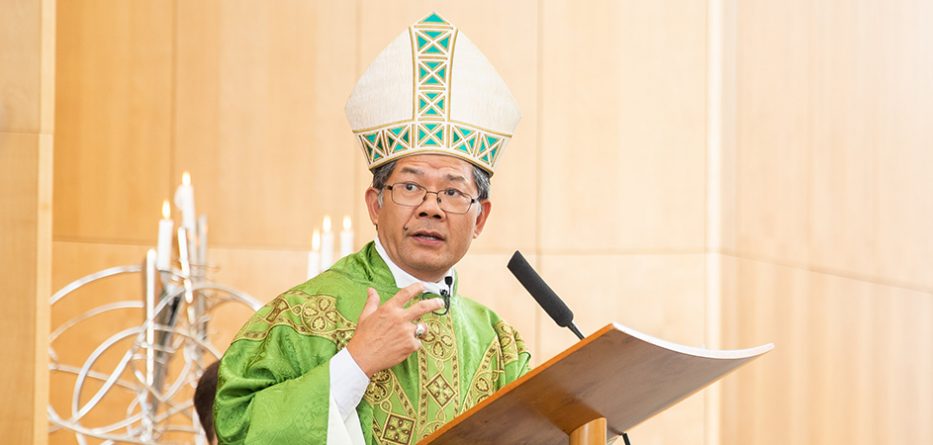Most Reverend Vincent Long Van Nguyen OFM Conv DD STL, Bishop of Parramatta
Homily for the 22nd Sunday in Ordinary Time Year C 2019 at St Luke’s Catholic Faith Community, Marsden Park
Readings: 1Sir 3:17-18, 20, 28-29; Heb 12:18-19, 22-24A; Lk 14:1, 7-14
1 September 2019
Embracing a discipleship of humility and service
Dear friends,
One of the most memorable events during my recent Ad Limina visit to Rome was the meeting with Pope Francis.
We were led to the Papal Hall via many parts of the huge building complex attached to the Basilica of St Peter. There was a very elaborate chair that was on display near the Papal Hall. This was the richly adorned, silk covered throne on which popes used to be carried on the shoulders of twelve men in red uniforms. It was a reminder of the Church that for centuries wallowed in power, ostentation and triumphalism.
Pope Francis could not have provided a more vivid contrast. He sat on an ordinary chair like the rest of us, not removed from us but part of a talking circle. In between questions and answers, he showed greater humility by serving water to his interpreter, using the cup that was meant for him. We had a distinct sense of a new paradigm in action: a Church of humility, inclusivity and shared leadership as opposed to one that emphasises privilege, elitism and self-referential pomp.
Scriptures for this Sunday teach us that humility has to be at the foundation of our lives as people of the Good News. The Book of Sirach, which contains the pearls of ancient Jewish wisdom exhorts us to conduct our affairs with humility and to humble ourselves even more if we happen to be in positions of power.
This teaching is not unique to our Judeo-Christian tradition. Confucius of China said something very similar some 500 years before Christ. Humility, he said, is the solid foundation of all virtues. No wonder, it was the object of spiritual pursuit in all religious traditions.
In the Gospel, Jesus however takes humility to a new level. It goes to the very nature of God and what it means to be His people. The world revels in power whereas God does the opposite. He is a self-emptying God. Jesus, the Suffering Servant, is the incarnation of a powerless God.
He gives us a completely different relational model, one not based on power and status but on humility and service, not on rights and entitlements but on gratuity and goodness. “Everyone who exalts himself will be humbled, and the person who humbles himself will be exalted.”
He goes on to challenge his followers to abandon the relational model of the world and adopt that of the Kingdom. The former has to do with competition, self-entitlement and self-centred behavior whereas the latter has to do with love, generosity and service towards others.
For Jesus, then, humility is at the heart of divinely inspired behaviour. It is not simply a matter of putting on some humble gestures or even reaching out to others in acts of charity and yet safeguarding our positions of power and privileges at all costs.
Rather, it is a radical discipleship of vulnerability and powerlessness that we are called to embrace. Jesus subverts the prevalent model of greatness and power associated with leadership. His model means the greatest has to become the smallest; the powerful has to become the powerless and the leader has to become the servant. It is a stark reminder of our commitment to be servants in imitation of the Servant Leader who came not to be served but to serve and to give his life for others.
Brothers and sisters,
So much of what is wrong with the Church today stems from the travesty of Christian leadership and service. When privilege, power and dominance are more evident than love, humility and servant-hood in the Church, then the very Gospel of the servant Jesus is at stake. What we need to reclaim for the Church forcefully and unequivocally is the discipleship of humility, love and service.
The Church in Australia has been dealt with more than a dose of humility. The image of Cardinal George Pell in handcuffs is symbolic of the fall from grace and power that we Catholics have to come to terms with. But the call of the Gospel today strengthens our resolve to be the humble, loving and serving Church rather than one that seeks its former influence, pomp and ceremony.
The Church has fallen in a state of disorientation. But it strengthens us that such a fall, like that of Paul on his way to Damascus, can cause us to rise to new consciousness. It comforts us, too, to know that the Church was at its best when it was poor, persecuted and without power.
This trying time may turn out to be the best time to be part of a humble, loving and servant Church. Only by dying to power, domination, ostentation and rising to humility, simplicity, servant-hood can we be catalysts for renewal and agents of the Gospel.
Let us pray that as a community of disciples, we learn to be humble servants of one another. May we be strengthened to walk the journey of faith with one another and with those entrusted to our care. May we learn to become servants of the Kingdom and visible signs of hope and sacraments of God’s light to them.








